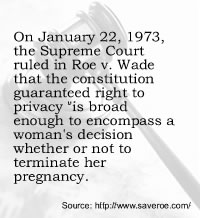30 Years Later: Roe vs. Wade
- January 31, 2003
- |
- Lisa Ashby, Staff Writer
- Section: News
Is a woman's body really her own?
A little over 30 years ago many states across the nation set laws prohibiting abortion under any circumstances unless the birth endangered the life of the mother.
In 1973, a pregnant woman from Texas, known as “Jane Roe,” was looking for a legal way to end her pregnancy. Because of a law in Texas that prohibited abortions unless necessary to save the mother's life, she filed a lawsuit against Texas that eventually went in front of the Supreme Court.
With the 7-2 Supreme Court ruling on Jan. 22, 1973, Roe won her case that made it legal for women to get an abortion during the entire pregnancy if she feels she needs it. However, states can restrict abortions as they see fit.
This ruling made the services safer and more available to women around the country regardless of the reason why the abortion was desired.
Courts later ruled that restricting a woman's right to an abortion violated the Fourteenth Amendment and 46 states felt the brunt of that ruling.
From 1973 to 1996, there were an estimated 37 million abortions according to www.roevwade.org/rvw1.html, a site established to mark each anniversary of this landmark case. That number will continue to rise in the future.
The effects of this ruling have trickled down through the years, affecting each generation that comes of age and takes the responsibilities of its actions. The nation is still torn to this day about this very sensitive issue.
“It seems as though abortion is a way of getting out of situations, if the mother dies in birth then that was God's way of her passing and for some reason it just doesn't seem as though people realize they are killing a new life created by God, it doesn't phase some people at all, it's just another issue in the society according to many people these days,” said C.J. Chapman, a sophomore Pre-Physical therapy major from Franklin.
Defending the other side, John Stewart, a sophomore Political Science major from Dickson, shared the same viewpoint as many women. “I am for abortion and resent the talk that it is being thought of to be overturned. I feel women who have been assaulted deserve a chance to get their life back. Despite a woman's moral and political values, it was deemed through this case that it was her choice to decide if she wanted to keep her baby or not. Protestors have argued that a woman should not have the right to abort her child because of reasons other than medical or being raped.
“Every issue is going to have its other side,” Stewart said. “I feel that it is deserved to look at it more from a useful standpoint because those who are using it to get out of sticky situations are going to do it anyway whether or not it is legal because they can afford to do it. Furthermore, if they are going to go overseas to get it done where it is legal, if we overturn it then we should be the ones getting the money for the operations and help out our struggling economy.”
This ruling affects females on the campus of UTM, as well as women across America. Each woman has an opinion about abortion on whether it is right or wrong. Regardless of the opinion, this ruling proved to be a stepping stone for women, not seen since women won the right to vote.
